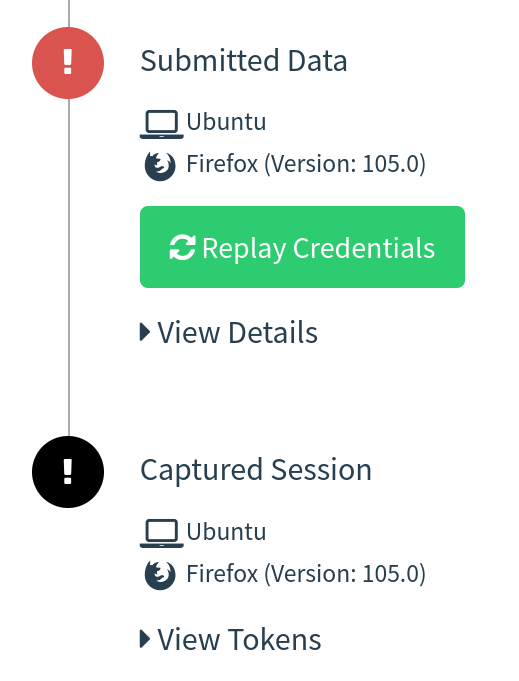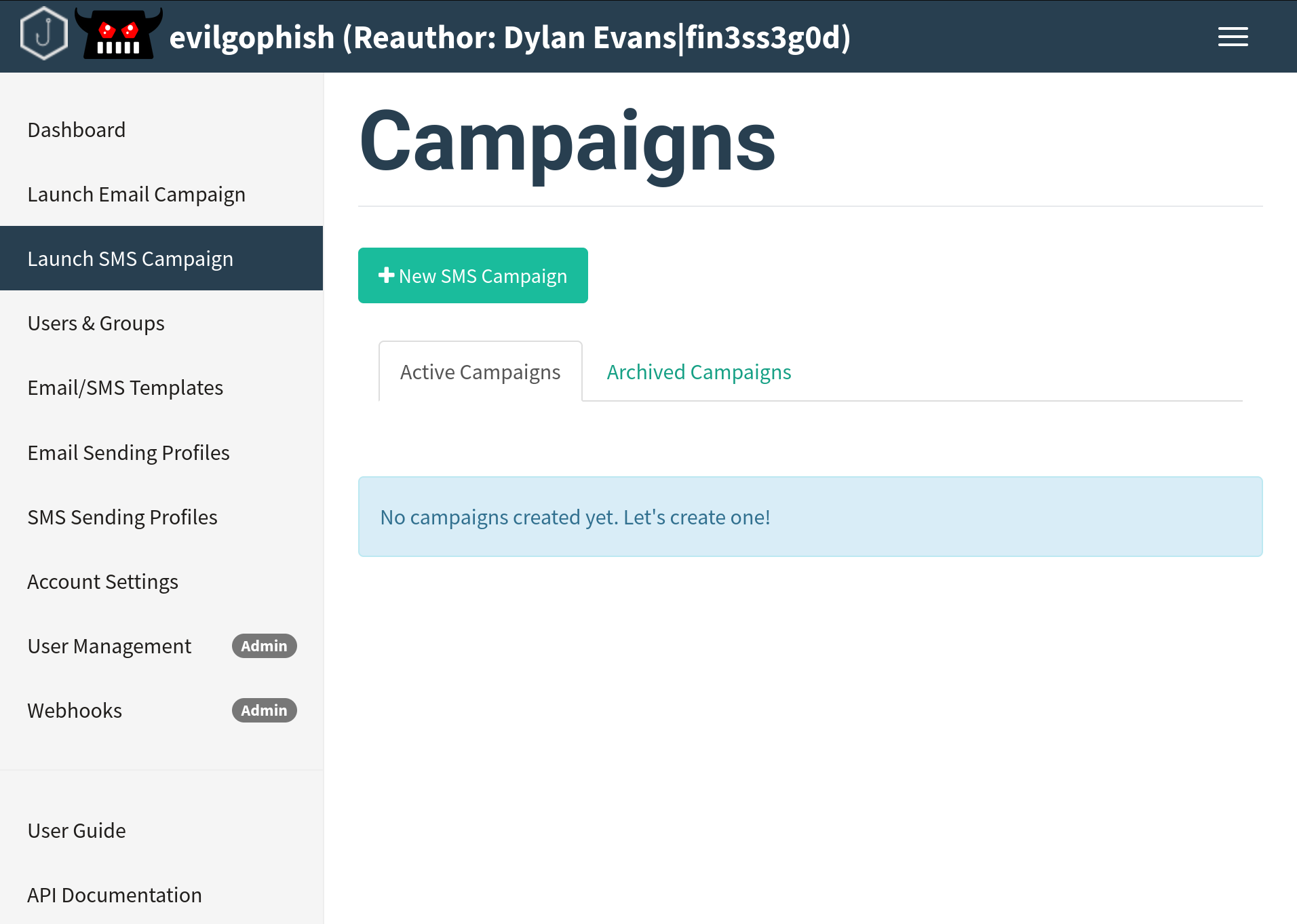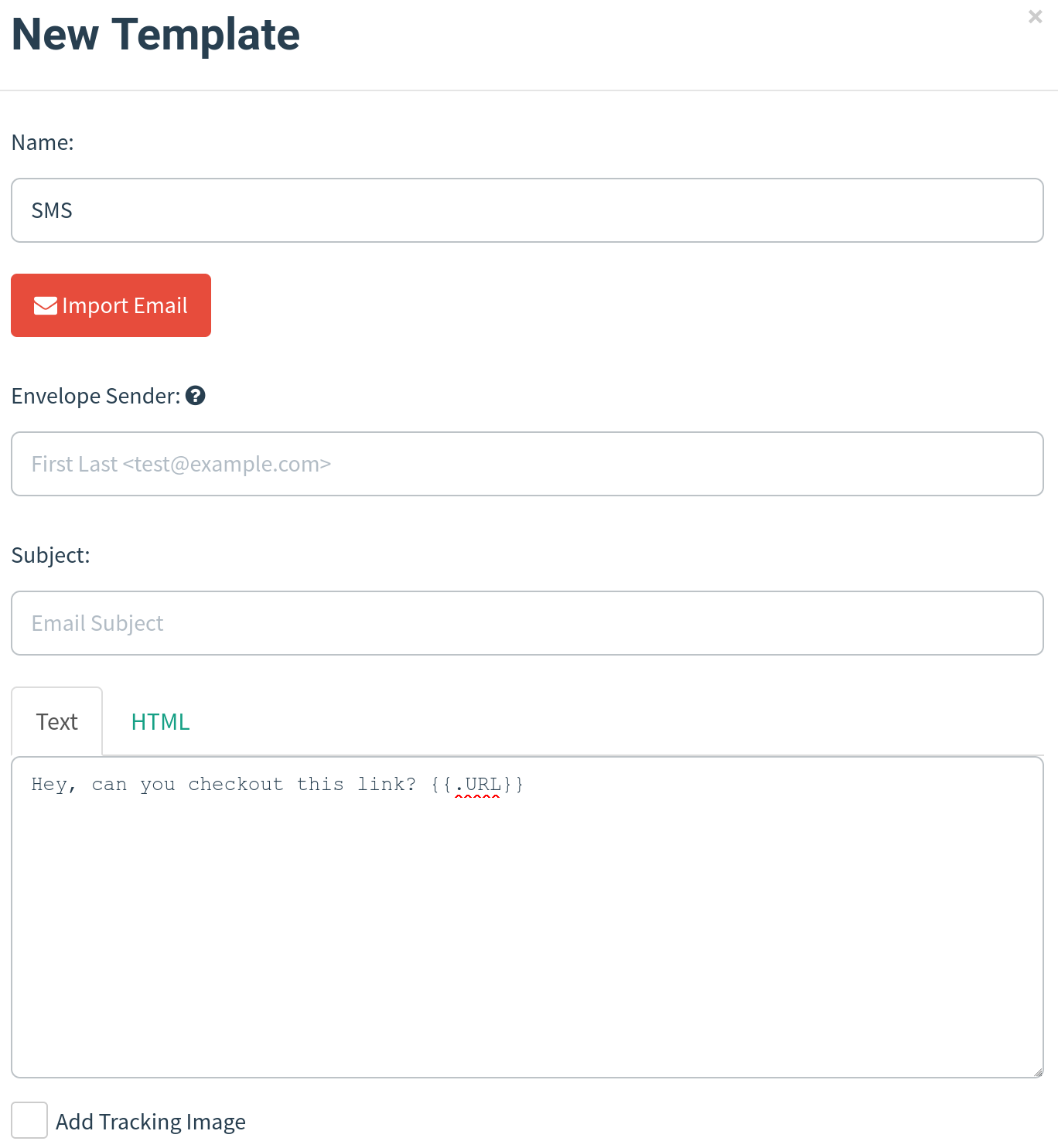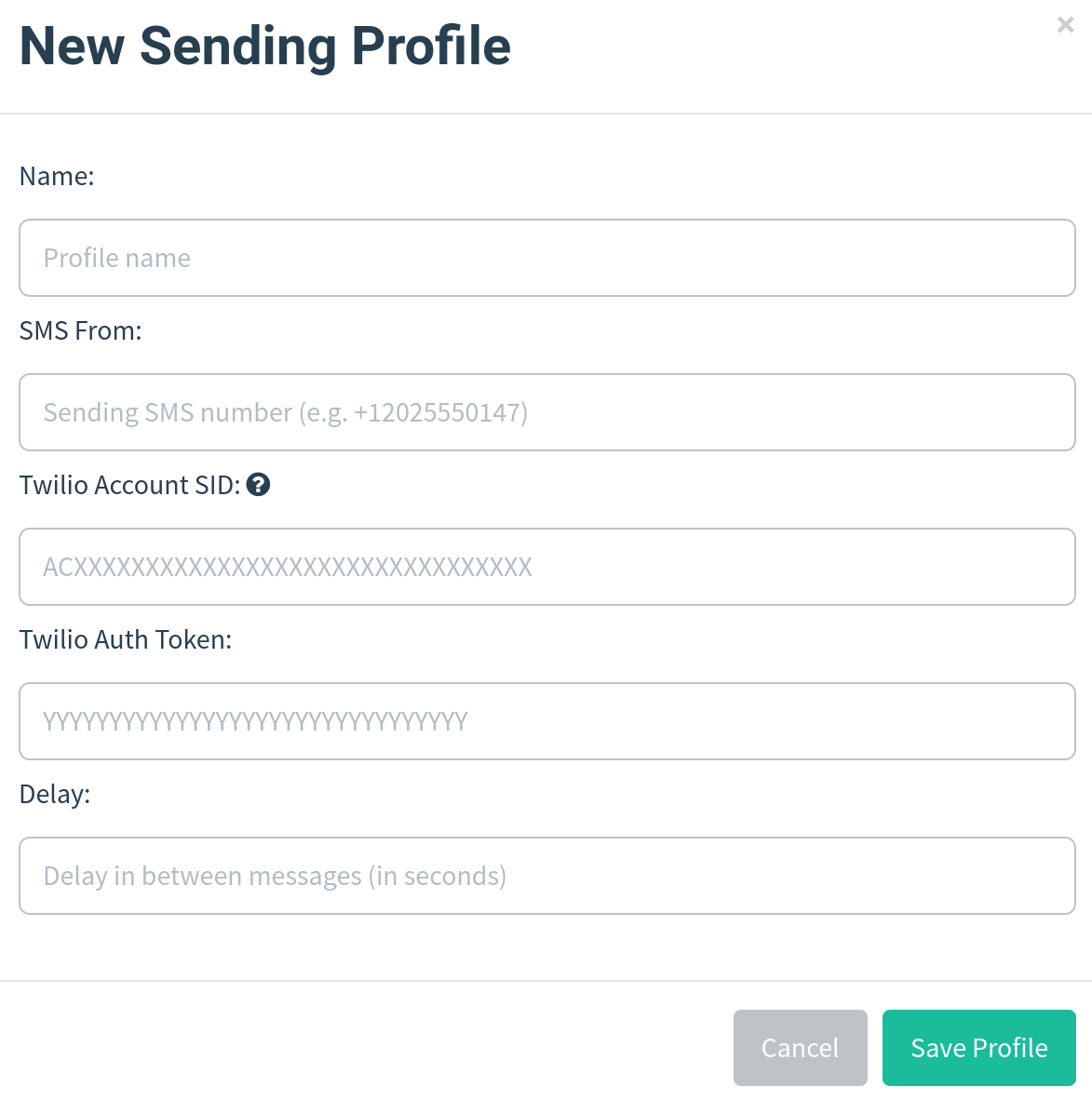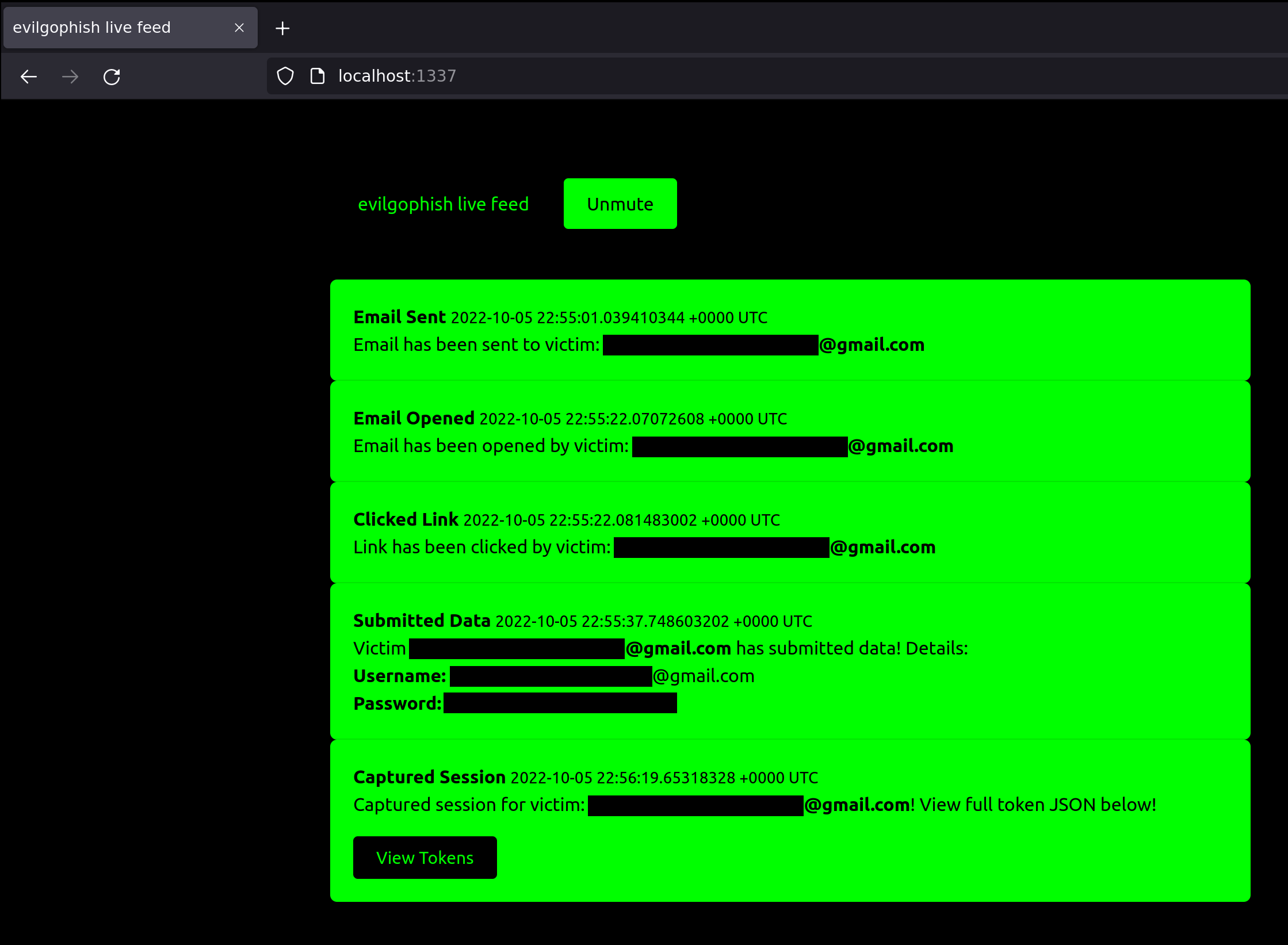- evilgophish
- Credits
- Prerequisites
- Disclaimer
- Why?
- Background
- Infrastructure Layout
- setup.sh
- replace_rid.sh
- Email Campaign Setup
- SMS Campaign Setup
- Live Feed Setup
- Google reCAPTCHA v2 Setup
- Phishlets Surprise
- A Word About Phishlets
- Debugging
- Apache2 Customiization
- Installation Notes
- A Note About Campaign Testing And Tracking
- A Note About The Blacklist and Tracking
- Changes To evilginx2
- Changes to GoPhish
- Changelog
- Issues and Support
- Future Goals
- Contributing
Combination of evilginx2 and GoPhish.
Before I begin, I would like to say that I am in no way bashing Kuba Gretzky and his work. I thank him personally for releasing evilginx2 to the public. In fact, without his work this work would not exist. I must also thank Jordan Wright for developing/maintaining the incredible GoPhish toolkit.
You should have a fundamental understanding of how to use GoPhish, evilginx2, and Apache2.
I shall not be responsible or liable for any misuse or illegitimate use of this software. This software is only to be used in authorized penetration testing or red team engagements where the operator(s) has(ve) been given explicit written permission to carry out social engineering.
As a penetration tester or red teamer, you may have heard of evilginx2 as a proxy man-in-the-middle framework capable of bypassing two-factor/multi-factor authentication. This is enticing to us to say the least, but when trying to use it for social engineering engagements, there are some issues off the bat. I will highlight the two main problems that have been addressed with this project, although some other bugs have been fixed in this version which I will highlight later.
- Lack of tracking -
evilginx2does not provide unique tracking statistics per victim (e.g. opened email, clicked link, etc.), this is problematic for clients who want/need/pay for these statistics when signing up for a social engineering engagement. - Session overwriting with NAT and proxying -
evilginx2bases a lot of logic off of remote IP address and will whitelist an IP for 10 minutes after the victim triggers a lure path.evilginx2will then skip creating a new session for the IP address if it triggers the lure path again (if still in the 10 minute window). This presents issues for us if our victims are behind a firewall all sharing the same public IP address, as the same session withinevilginx2will continue to overwrite with multiple victim's data, leading to missed and lost data. This also presents an issue for our proxy setup, sincelocalhostis the only IP address requestingevilginx2.
In this setup, GoPhish is used to send emails and provide a dashboard for evilginx2 campaign statistics, but it is not used for any landing pages. Your phishing links sent from GoPhish will point to an evilginx2 lure path and evilginx2 will be used for landing pages. This provides the ability to still bypass 2FA/MFA with evilginx2, without losing those precious stats. Apache2 is simply used as a proxy to the local evilginx2 server and an additional hardening layer for your phishing infrastructure. Realtime campaign event notifications have been provided with a local websocket/http server I have developed and full usable JSON strings containing tokens/cookies from evilginx2 are displayed directly in the GoPhish GUI (and feed):
evilginx2will listen locally on port8443GoPhishwill listen locally on port8080and3333Apache2will listen on port443externally and proxy to localevilginx2server- Requests will be filtered at
Apache2layer based on redirect rules and IP blacklist configuration- Redirect functionality for unauthorized requests is still baked into
evilginx2if a request hits theevilginx2server
- Redirect functionality for unauthorized requests is still baked into
- Requests will be filtered at
setup.sh has been provided to automate the needed configurations for you. Once this script is run and you've fed it the right values, you should be ready to get started. Below is the setup help (note that certificate setup is based on letsencrypt filenames):
Usage:
./setup <root domain> <subdomain(s)> <root domain bool> <redirect url> <feed bool> <rid replacement> <blacklist bool>
- root domain - the root domain to be used for the campaign
- subdomains - a space separated list of evilginx2 subdomains, can be one if only one
- root domain bool - true or false to proxy root domain to evilginx2
- redirect url - URL to redirect unauthorized Apache requests
- feed bool - true or false if you plan to use the live feed
- rid replacement - replace the gophish default "rid" in phishing URLs with this value
- blacklist bool - true or false to use Apache blacklist
Example:
./setup.sh example.com "accounts myaccount" false https://redirect.com/ true user_id false
Redirect rules have been included to keep unwanted visitors from visiting the phishing server as well as an IP blacklist. The blacklist contains IP addresses/blocks owned by ProofPoint, Microsoft, TrendMicro, etc. Redirect rules will redirect known "bad" remote hostnames as well as User-Agent strings.
In case you ran setup.sh once and already replaced the default RId value throughout the project, replace_rid.sh was created to replace the RId value again.
Usage:
./replace_rid <previous rid> <new rid>
- previous rid - the previous rid value that was replaced
- new rid - the new rid value to replace the previous
Example:
./replace_rid.sh user_id client_id
Once setup.sh is run, the next steps are:
- Start
GoPhishand configure email template, email sending profile, and groups - Start
evilginx2and configure phishlet and lure (must specify full path toGoPhishsqlite3database with-gflag) - Ensure
Apache2server is started - Launch campaign from
GoPhishand make the landing URL your lure path forevilginx2phishlet - PROFIT
An entire reworking of GoPhish was performed in order to provide SMS campaign support with Twilio. Your new evilgophish dashboard will look like below:
Once you have run setup.sh, the next steps are:
- Configure
SMSmessage template. You will useTextonly when creating aSMSmessage template, and you should not include a tracking link as it will appear in theSMSmessage. LeaveEnvelope SenderandSubjectblank like below:
- Configure
SMS Sending Profile. Enter your phone number fromTwilio,Account SID,Auth Token, and delay in between messages into theSMS Sending Profilespage:
- Import groups. The
CSVtemplate values have been kept the same for compatibility, so keep theCSVcolumn names the same and place your target phone numbers into theEmailcolumn. Note thatTwilioaccepts the following phone number formats, so they must be in one of these three:
- Start
evilginx2and configure phishlet and lure (must specify full path toGoPhishsqlite3database with-gflag) - Ensure
Apache2server is started - Launch campaign from
GoPhishand make the landing URL your lure path forevilginx2phishlet - PROFIT
Realtime campaign event notifications are handled by a local websocket/http server and live feed app. To get setup:
-
Select
trueforfeed boolwhen runningsetup.sh -
cdinto theevilfeeddirectory and start the app with./evilfeed -
When starting
evilginx2, supply the-feedflag to enable the feed. For example:
./evilginx2 -feed -g /opt/evilgophish/gophish/gophish.db
- You can begin viewing the live feed at:
http://localhost:1337/. The feed dashboard will look like below:
IMPORTANT NOTES
- The live feed page hooks a websocket for events with
JavaScriptand you DO NOT need to refresh the page. If you refresh the page, you will LOSE all events up to that point.
A Google reCAPTCHA v2 implementation was created to help defend against bots. If this option is enabled, a visitor will have to complete a challenge before being granted access to a lure.
- First, sign up for an API key pair here: Google recaptcha admin
- Next, start
evilginx2with the-captchaflag and supply the public/private key separated by a:. For example:
./evilginx2 -feed -g ../gophish/gophish.db -captcha <PUB_KEY>:<PRIV_KEY>
Included in the evilginx2/phishlets folder are four custom phishlets not included in evilginx2.
o3652- modified/updated version of the originalo365(stolen from Optiv blog)google- updated from previous examples online (has issues since release, don't use in live campaigns)knowbe4- customcisco-vpn- custom - Captured web cookies were used to access internal networks viaopenconnectcommand-line tool with this phishlet and--cookieflag
I feel like the world has been lacking some good phishlet examples lately. It would be great if this repository could be a central repository for the latest phishlets. Submit a pull request for a chance to end up in evilginx2/phishlets. If you provide quality work, I will create a Phishlets Hall of Fame and you will be added to it.
Since Apache2 is the initial proxy used in this project, all requests ever made to the phishing server will be logged to /var/log/apache2/access_evilginx2.log*. These logs can be viewed to show all access to the phishing server and assist in troubleshooting issues. Running evilginx2 with the -debug flag will show cookies, URLs, and contents of incoming/outgoing requests.
You can modify how Apache2 operates by modifying /etc/apache2/sites-enabled/000-default.conf. You can serve content from a static directory to host payloads, configure different proxies, etc. You can make any change Apache2 supports. Restarting the server is mandatory for changes to take effect.
The installation script was tested on Ubuntu Focal/Jammy and installs the latest version of Go from source. Binaries may fail to build depending on your Go environment and what you have installed i.e. installing the original versions this project combines then trying to install this version of them. It also makes changes to DNS so evilginx2 can take it over. You should understand the implications of this and review it. A fresh environment is recommended and other operating systems haven't been tested.
It is not uncommon to test the tracking for a campaign before it is launched and I encourage you to do so, I will just leave you with a warning. evilginx2 will create a cookie and establish a session for each new victim's browser. If you continue to test multiple campaigns and multiple phishing links within the same browser, you will confuse the tracking process since the RId value is parsed out of requests and set at the start of a new session. If you are doing this, you are not truly simulating a victim as a victim would never have access to another phishing link besides their own and goes without saying that this will never happen during a live campaign. This is to fair warn you not to open an issue for this as you are not using the tool the way it was intended to be used. If you would like to simulate a new victim, you can test the tracking process by using a new browser/tab in incognito mode.
The Apache blacklist is now optional. If you decide to use it, it may cause some clients to get blocked and disrupt the tracking process. The reason being is organizations may request links through a proxy falling in blocked ranges. It is up to you to perform test campaigns and verify if any blocking will disrupt your campaign tracking. A blocked client will receive a 403 Forbidden error. /var/log/apache2/access_evilginx2.log* can be viewed for remote IP addresses accessing the phishing server. You can remove entries in the /etc/apache2/blacklist.conf file that are causing a tracking issue and restart Apache. Or you can remove the Location block in the /etc/apache2/sites-enabled/000-default.conf file and restart Apache to remove IP blacklisting altogether. Users have also reported issues with setting evilginx2's built-in blacklist feature to unauth.
- All IP whitelisting functionality removed, new proxy session is established for every new visitor that triggers a lure path regardless of remote IP
- Fixed issue with phishlets not extracting credentials from
JSONrequests - Further "bad" headers have been removed from responses
- Added logic to check if
mimetype was failed to be retrieved from responses - All
Xheaders relating toevilginx2have been removed throughout the code (to remove IOCs) - Added phishlets
GoPhish is never used in any of your actual phishing pages and email headers have been stripped, so there's no need to worry about IOCs within it.
- Default
ridstring in phishing URLs is chosen by the operator insetup.sh - Added
SMSCampaign Support
See the CHANGELOG.md file for changes made since the initial release.
I do this for fun and on my free time, but I also work a full-time job so I will not respond to issues unless I see benefit. Issues without output are highly likely to be ignored/deleted.
- Test/review/pull
evilginx3when it releases - Additions to IP blacklist and redirect rules
- Add more phishlets
I would like to see this project improve and grow over time. If you have improvement ideas, new redirect rules, new IP addresses/blocks to blacklist, phishlets, or suggestions, please open a pull request.
